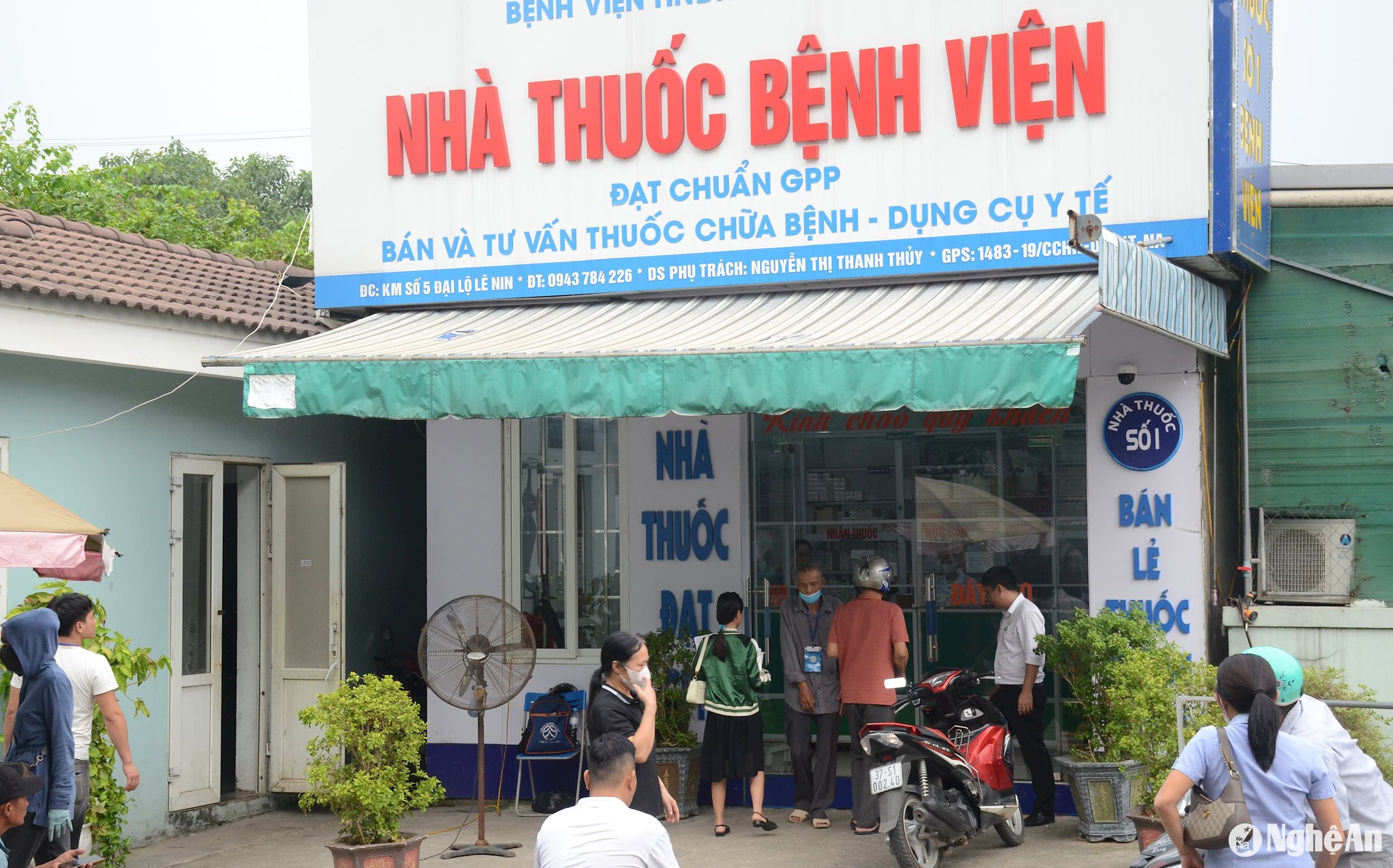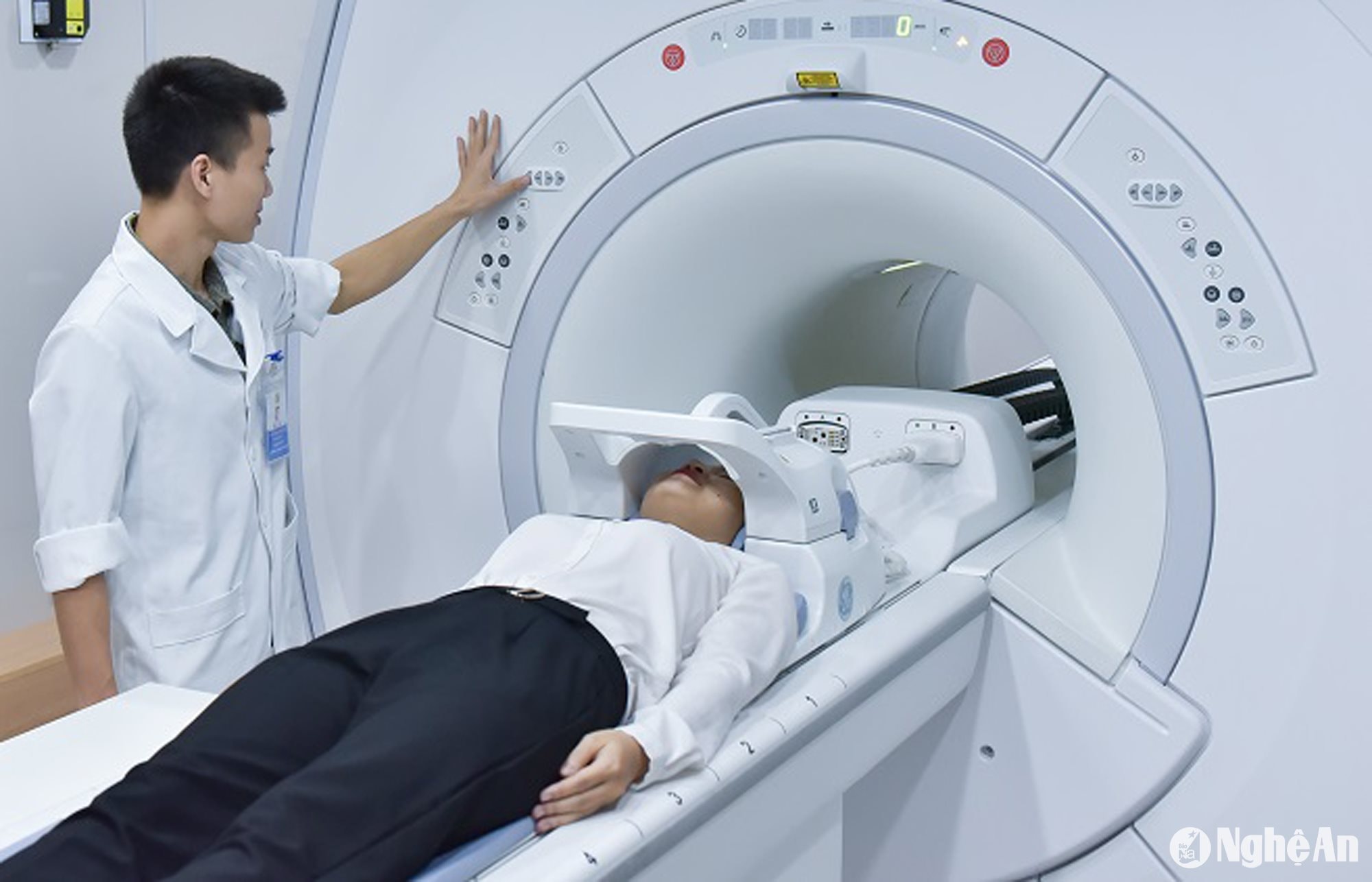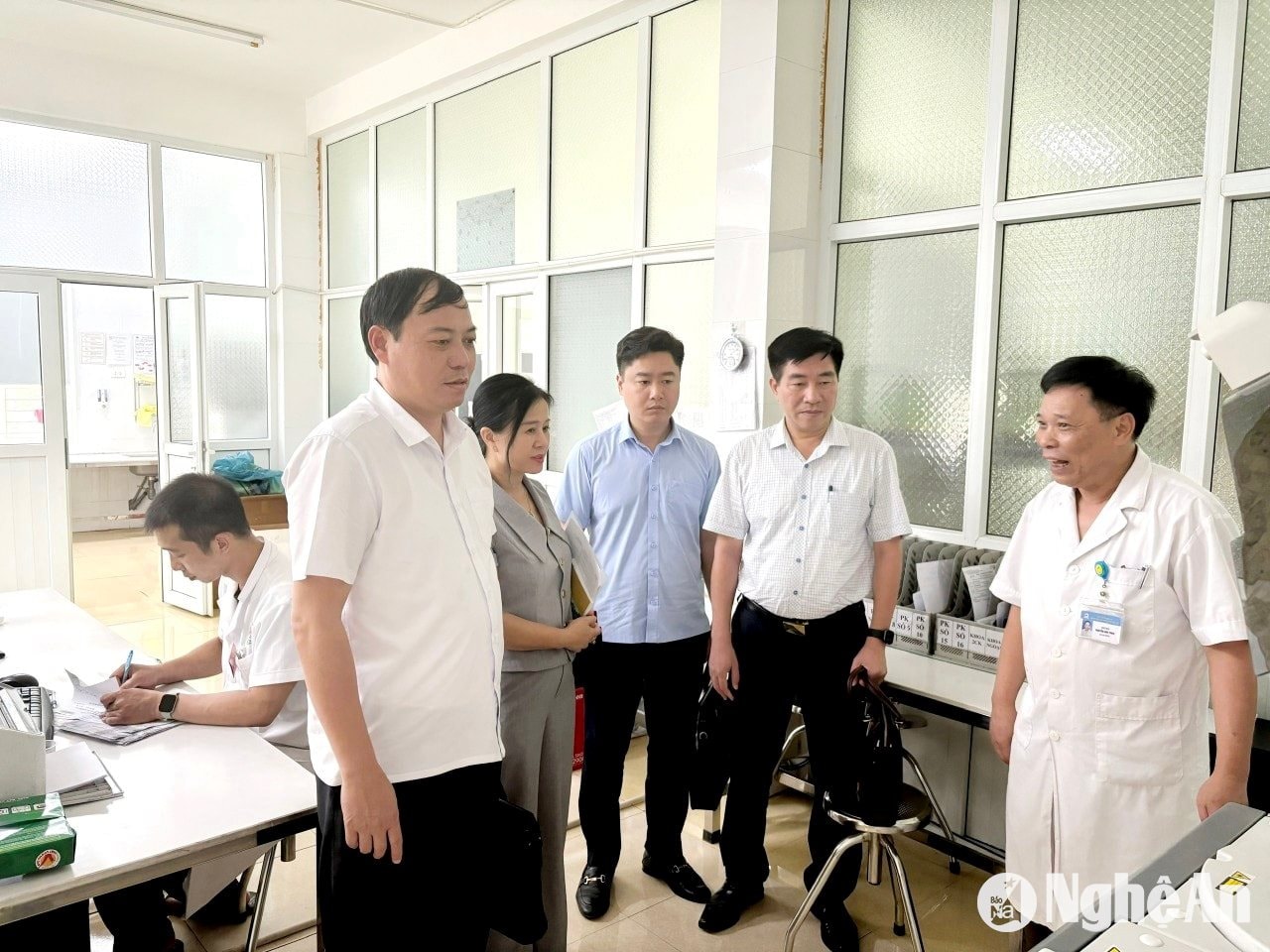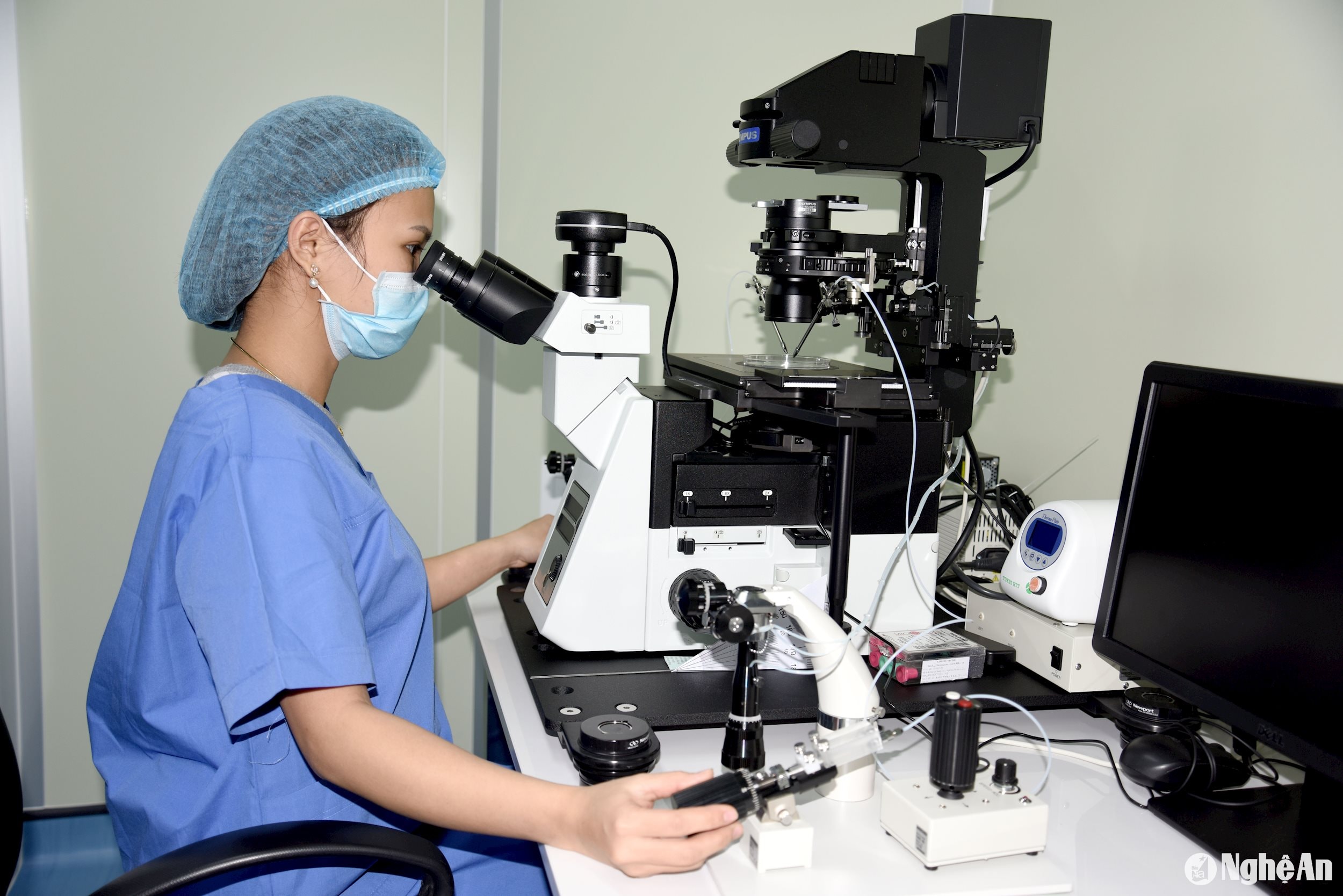The shortage of medicine, supplies and medical equipment causes patients to suffer double losses.
Shortages of drugs, chemicals, supplies and medical equipment are greatly affecting the rights of patients participating in health insurance.
Patients in difficulty
Currently, many medical facilities in Nghe An province are lacking drugs, supplies and medical equipment, especially high-tech equipment, advanced diagnostic and treatment equipment. This has seriously affected thequality of medical examination and treatmentand benefits of health insurance participants.
At the province's leading hospital specializing in Internal Medicine, Surgery, Obstetrics and Gynecology, a shortage of drugs and medical supplies is occurring, causing frustration for patients and their families.
Mr. NHT, from Nam Dan district, whose wife was about to give birth at the Obstetrics Department, hurriedly went to the hospital pharmacy to buy medicine and medical supplies as prescribed by the doctor. Mr. NHT said: The doctor asked me to go to the pharmacy to buy painkillers and a labor support kit to help my wife give birth. The doctor said that because the hospital did not have these medicines and supplies, the family had to buy them themselves. It is known that these two items are covered by health insurance. Meanwhile, my wife has health insurance... Very frustrating, but in order to have a "safe mother and healthy child", no matter how much it costs, we have to take care of it.

Also at the above hospital, not only is there a shortage of medicine and medical supplies, but there is also a shortage of medical equipment. It is known that for many reasons, for the past 2 years, the hospital has not been able to bid or purchase any medical equipment. The hospital originally had an MRI system (purchased through a joint venture). However, this system has not been established as a public ownership system, so it cannot be used. Due to the lack of machines, every day, the hospital has to transport dozens of patients to a nearby non-public hospital for scans. This request not only makes the hospital lose its brand but also brings inconvenience and fatigue to patients. The hospital is trying to bid and purchase a new MRI system this year.
Mr. N.D.N, 58 years old, in Hung Nguyen district, is being treated at a provincial specialized hospital and said: During the hospitalization after surgery, the doctor prescribed and asked the patient's family to buy the medicine themselves. The medicine that had to be bought included Albumin (increases serum concentration) and Alphachymotrypsin (anti-inflammatory drug). When the family asked, the doctor said that the hospital had run out of medicine and was waiting for the bidding results. The family learned that this medicine was covered by health insurance. When sick, people pray in all directions, and the doctor told them to buy it, so the family had to go buy it.
It can be said that the shortage of drugs, equipment, and medical supplies at public hospitals has put an additional burden on health insurance patients while their legitimate benefits are not enjoyed. Health insurance patients are hoping that this situation will soon end to ensure their rights when being examined and treated.

In a recent survey by the Provincial People's Council's Culture and Social Affairs Committee on drug procurement, management and use, many hospitals said that the current local shortage of drugs, supplies and medical equipment is occurring throughout the province, from provincial hospitals to district hospitals and health stations.
“The shortage of medicines, supplies and medical equipment is an alarming situation, occurring in all medical facilities in the province. All medical facilities in the province do not have enough medicines, supplies and medical equipment, which significantly affects the treatment and rights of patients with health insurance cards” - A hospital leader discussed with the Survey Team of the Provincial People's Council's Culture and Social Affairs Committee.
What is the cause?
Bidding failure in many packages:
One of the reasons for the shortage of drugs, supplies, and medical equipment in hospitals is that bidding failures often occur in items with small quantities, low values, and few bidders. Some items, despite being repeatedly bid for, have not been able to select a bidder. For example, Nghe An General Hospital has a drug bidding failure rate compared to the needs of departments, rooms, and centers of about 30%, and some traditional medicine bidding packages have a bidding failure rate of up to 90%.

Nghe An Obstetrics and Pediatrics Hospital has invited bids and re-bids for many items but has not been able to select a winning bidder because the bidder did not participate or participated but the price exceeded the planned price, leading to a high bid failure rate, such as: Bidding package for the supply of chemicals, biological products and other supplies in 2023 for Nghe An Obstetrics and Pediatrics Hospital with a bid failure rate of up to 50%; Bidding package No. 01: Supply of supplies and medical gases not covered by Circular 04/2017/TT-BYT for Nghe An Obstetrics and Pediatrics Hospital in 2023-2024 with a bid failure rate of 46%,...
Not only provincial hospitals, district hospitals such as Nghi Loc General Hospital: the winning bid rate is only 70%, the failing bid rate is 30%, there are bid packages with the failing bid rate up to 50%.
Lack of drugs and supplies in the transition period:
In addition, the phenomenon of drug and material shortages occurs during the bidding transition period because the procurement process is long and complicated (average 6-8 months), leading to delays, affecting treatment work. In 2024, when there are full documents guiding units to carry out bidding for the procurement of drugs, chemicals, testing supplies, and medical equipment, while many winning bid decisions have expired but there are no new decisions to replace them, thus disrupting the supply of goods at medical facilities. Therefore, there is a phenomenon of local shortages of drugs, chemicals, and medical equipment during this period.
Supply is intermittent and intermittent:
After the contractor selection results were announced, some drugs won the bid but the contractors supplied them in small quantities or were unable to supply them. The main reasons were the interruption of raw material supply, war and epidemic situations affecting imports, failure to renew drug registration numbers in time, changes in factory production plans, etc.
Regular maintenance and repair of medical equipment at public medical facilities in the province faces many difficulties:
Many old, damaged, and repaired equipment have exceeded their depreciation period but have not been liquidated or replaced in a timely manner; there are equipment that, although damaged, are not repaired in a timely manner, causing prolonged waste in many units. For example: Nghe An Oncology Hospital has some damaged medical equipment but has not been repaired in a timely manner, leading to the phenomenon of some medical equipment being left unused, the hospital has to "take pictures from others" such as: 1 digital mammography X-ray machine, 1 general digital X-ray machine, 1 biopsy support robot and all large medical equipment that has not been maintained and serviced periodically according to regulations such as MRI system, CT system, general digital X-ray, Spect imaging system.
Nghe An Endocrinology Hospital has 2 ultrasound machines (4D digital color Doppler ultrasound machine and 3 probes and portable color ultrasound machine) that are currently broken and cannot be repaired. Que Phong District Medical Center currently has 132 medical devices but 4 devices are broken and have not been repaired.

Relevant legal documents have many changes, many contents are not unified:
Some hospitals have not yet provided specific instructions, leading to difficulties in implementation. According to some hospitals, although the 2023 Bidding Law takes effect from the beginning of 2024, it took 2 months for Decree 24/2024/ND-CP to come into effect, and on April 26, 2024, the Ministry of Planning and Investment issued Circular No. 06/2024/TT-BKHĐT guiding the sample documents for contractor selection, and on May 17, 2024, the Ministry of Health issued Circular No. 07/2024/TT-BYT on drug bidding. Therefore, from June, when medical facilities start the procurement process, it will take another 3-5 months to have drugs and supplies to serve medical examination and treatment. On the other hand, implementing the provisions of the new Bidding Law has many difficulties and problems, leading to the bidding process taking a long time.
In addition, in the province, the decentralization of purchasing decision authority to the Heads of public service units is still limited: Heads of public service units decide on the purchase of goods and services for bidding packages and purchase contents with a value of less than 100 million VND/1 unit of goods and services or a total purchase value of less than 150 million VND/one purchase of many types of goods and services.
Meanwhile, current procurement packages for goods at medical facilities are all of high value, the above regulation will lead to units not being proactive in purchasing urgent goods to serve the unit's operations.
To overcome this situation,The Department of Health and Hospitals have requested the Ministry of Health to soon issue a Circular related to the classification of medical equipment in order to classify the quality of medical equipment. The Ministry of Planning and Investment should soon complete the legal framework and legal documents on procurement bidding.
In addition, the units also proposed that the province establish a centralized procurement center of the province to carry out bidding procedures for drugs, chemicals, supplies, medical equipment, and chemicals to facilitate medical facilities in supplying large quantities of drugs, chemicals, and supplies, saving human resources and avoiding the situation of bid failure due to small-scale procurement at the units.
Propose that the Provincial People's Council consider and amend Resolution No. 02/2018/NQ-HDND on decentralization of purchasing authority in Nghe An province in the direction of increasing decentralization for units in purchasing drugs, chemicals, testing supplies, and medical equipment so that units can proactively and conveniently purchase and bid for urgent items in a timely manner.
